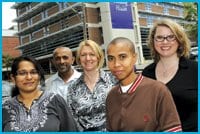There’s a new organization pushing for queer-friendly healthcare in Ontario. Rainbow Health Ontario (RHO) is now running training and outreach projects out of its new headquarters at Toronto’s Sherbourne Health Centre, although it’s not expected to launch officially until fall.
“Human rights legislation and our treatment of lesbian and gay and to some degree trans people has changed a lot for the better,” says RHO executive director Anna Travers. “But people are still not very sure how to provide culturally competent care. People still encounter discrimination or, at least, heterosexist approaches in care and treatment, so we want to build knowledge and awareness.”
The provincial ministry of health has committed to funding RHO to the tune of $600,000 per year until 2010. Part of that money will pay the organization’s staff, which so far includes Travers, three coordinators and a part-time administrative assistant. They will soon be joined by a team of volunteers, and by regional representatives who will help make RHO a province-wide organization.
For the moment the ministry is RHO’s only source of funding, but Travers hopes that won’t be the case for long.
“We are working to build partnerships for funding and collaborative projects with other funders and organizations,” she says.
Over the summer RHO will recruit 14 reps around the province who will gather information from their local communities. There’ll be one representative for each of the Local Health Integration Networks (LHINS) — the community-based nonprofit organizations created by the provincial government in 2006 to determine regional health service needs.
“We want people who can function as the eyes and ears of the community, who are well connected and who have a lot of time and energy and passion for this,” says Travers. “We’ll be working very closely with them to get a picture of what’s going on in each area, to help them work with their communities and also bring local information to the new LHIN decision-making bodies.”
Part of RHO’s mandate will be to consolidate information about what programs and resources are available and make that information freely available on its website.
“We’re building a whole series of databases that will help people find different kinds of resources, print materials and articles, and things that will help people get training,” says Travers.
RHO will offer queer-specific training to healthcare providers and advise universities and colleges in the development of queer-friendly curriculum for medical faculties and other health-related training programs. There are also plans to hold a biannual conference to facilitate networking and information sharing.
“We ourselves often don’t know a lot about our health issues,” Travers says. “There’s not a lot of research into LGBT health issues aside from HIV and AIDS. We often don’t have the evidence we need to go to people and say, ‘These are the kind of programs we need,’ so it’s a bit of a vicious cycle and we’re trying to break that.”
Travers says RHO will cover some of the same ground as the preexisting Rainbow Health Network. “The Rainbow Health Network is basically a group of volunteers who are activists and interested in promoting better health and healthcare for LGBT people,” says Travers. “Rainbow Health Ontario has been set up by the ministry with a provincial mandate, and will have funding to carry out many more activities.”
Although RHO’s office in Toronto is already active in training and outreach projects, they have not yet set a date for an official launch.
“We’re probably aiming for the fall,” Travers says. “We want to have certain things in place, like our website. We’ll also want the minister [of health George Smitherman] to participate because he’s taken a great interest in this. And we want to have some input from people in other parts of the province so it’s not solely a Toronto thing.”

 Why you can trust Xtra
Why you can trust Xtra


